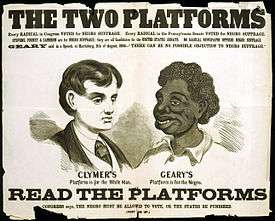Hiester Clymer
| Hiester Clymer | |
|---|---|
 | |
| Member of the U.S. House of Representatives from Pennsylvania's 8th district | |
|
In office March 4, 1873 – March 3, 1881 | |
| Preceded by | James L. Getz |
| Succeeded by | Daniel Ermentrout |
Hiester Clymer (1827 – June 12, 1884) was an American political leader from the state of Pennsylvania. Clymer was a member of the Hiester family political dynasty. He was the nephew of William Muhlenberg Hiester and the cousin of Isaac Ellmaker Hiester. Although Clymer was born in Pennsylvania, he was adamantly opposed to Abraham Lincoln's Administration and the Republican party's prosecution of the American Civil War. Elected Pennsylvania state senator in 1860, Clymer adamately opposed state legislation that supported the state Republican party's war effort. After the American Civil War ended, Clymer unsuccessfully ran for the Pennsylvania Governor's office in 1866 on a white supremacist platform against Union Major-General John W. Geary. After his election to the U.S. House of Representatives in 1872 as a Democrat, Clymer would be primarily known for his investigation of Sec. William W. Belknap's War Department in 1876. Belknap escaped conviction in a Senate trial, since he resigned his cabinet position before being impeached by the House of Representatives. Having retired from the House of Representatives in 1881, Clymer served as Vice President of the Union Trust Co. of Philadelphia and president of the Clymer Iron Co until his death in 1884.
Early life
Clymer was born in Morgantown, Berks County, Pennsylvania on November 3, 1827. He attended Princeton University, studied law, and was admitted to the bar in 1849. Clymer practiced law in Berks County and Schuylkill County, Pennsylvania.
Political career

He was a delegate to the National Convention of the Democratic Party in 1860 and 1868. He served in the Pennsylvania State Senate from 1861 to 1868.[1] He ran unsuccessfully for Governor of Pennsylvania in 1866 on a white supremacist policy, losing to John W. Geary. In the controversial campaign, Clymer's camp produced some of the most virulently graphic racist posters and pamphlets of the decade.[2]
U.S. Representative (1873-1881)
He was elected to the United States House of Representatives in 1872 and served from March 4, 1873 to March 3, 1881. While in Congress, he served on the Committee on Appropriations and the Committee on Expenditures in the Department of State, and as chairman of the Committee on Expenditures in the Department of War.
Retirement and death
After he left Congress, he served as vice president of the Union Trust Company in Philadelphia and as president of the Clymer Iron Company. He died in Reading, Pennsylvania, on June 12, 1884.
Further reading
- United States Congress. "Hiester Clymer (id: C000539)". Biographical Directory of the United States Congress.
- The Political Graveyard
References
- ↑ Cox, Harold. "Senate Members C". Wilkes University Election Statistics Project. Wilkes University.
- ↑ Wood, Forrest G. (1970). Black scare: the racist response to emancipation and reconstruction. p. 79. Retrieved 26 April 2016.
| United States House of Representatives | ||
|---|---|---|
| Preceded by James L. Getz |
Member of the U.S. House of Representatives from Pennsylvania's 8th congressional district 1873-1881 |
Succeeded by Daniel Ermentrout |